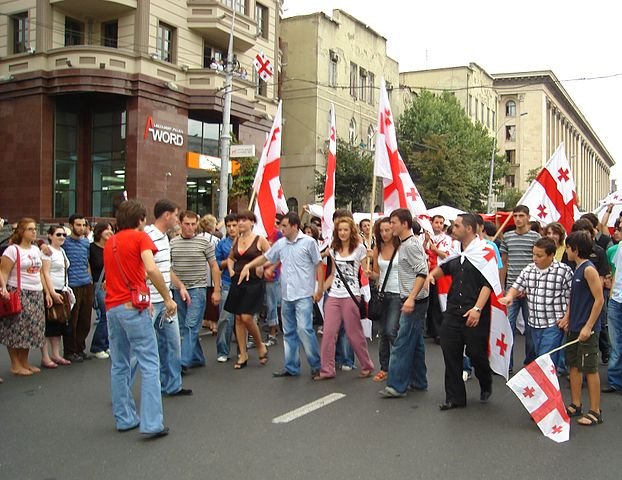
@Liveuamap 2nd day of great protest in Georgia, #Tbilisi around 20K+ people have gathered to protest 31 octomber rigged elections, protests are also continueing all across country especially in #batumi https://t.co/GlkMKHFmy9 pic.twitter.com/3opGEXMDmP
— Geo (@barbie_geo) November 9, 2020
Peaceful Assembly
Georgian voters protest election results
After parliamentary elections which took place on 31st October 2020, the Georgian opposition, formed by several political parties, announced that it would not accept the results of the vote and urged supporters to go out in protest. This followed claims that the elections did not meet all the legal requirements, and that several attempts to rig the elections had been identified by the monitoring missions.
As a result, Demonstrations against the preliminary election results were announced for 1st November 2020. Opposition parties called for fresh elections and chanted anti-Georgian Dream slogans in front of the parliament building (Rustaveli Avenue).
In several constituencies the counting of votes took longer, prompting citizens to protest near the polling stations in those constituencies. On 4th November 2020, according to the Georgian press, three people were injured and 12 people were detained by the police as protesters alleged incorrect counting of votes and called for a recount. Later, five people were released from custody while the other seven were charged in court. The opposition vowed to continue with the protests.
Between 8th and 9th November 2020, several violent clashes took place between protesters and law enforcement. First, the protesters gathered in front of the parliament building, from where they went to the headquarters of the Central Electoral Commission (CEC). In front of the CEC building, they chanted slogans against the leadership of the Commission. Violence started during the evening of 8th November when the police used water cannon against the protesters without prior notice. The interior minister later said the decision was justified as the Central Electoral Commission would have been besieged. After midnight, police again used water cannon or even tear gas or pepper spray, according to the journalists, when other protesters joined the crowd in front of the CEC.
On the morning of 9th November 2020, representatives of the Ministry of Interior announced that 19 people had been detained for disturbing public order and disobeying the orders of the police. Human rights NGOs, as well as the Public Defender, argued that the use of water cannon against protesters was not justified. The protests continued in the following weeks.
Study shows how COVID-19 affected human rights in Georgia
On 23rd October 2020, several Georgian CSOs presented the findings of the study on “Democracy and Human Rights during the pandemic and the state of emergency”. Regarding the restrictions imposed on the freedom of assembly, the researchers found that authorities used non-convincing arguments to justify the obstruction of this right. According to the experts, the restrictions were unconstitutional.
Expression
RSF asked Georgian authorities to protect journalists during electoral campaign
On 29th September at least five journalists were attacked while covering the election campaigns, according to reports by Reporters without Borders (RSF). The journalists were attacked while covering altercations between the opposition activists (United National Movement) and representatives of the ruling party (Georgian Dream) in the southern town of Marneuli.
RSF called on the authorities to ensure security for journalists covering topics dedicated to the election campaign and to create the necessary conditions for them to be able to fulfil their duties.
Media Advocacy Coalition denounces harassment of opposition media
In a statement on social media on 12th December2020, pro-opposition Mtavari Akrhi TV Director Nika Gvaramia claimed that he had received threats from the ruling Georgian Dream party because of his critical views. According to the journalist, he was threatened with arrest and confiscation of his property.
The coalition’s statement read in part:
“We are worried that the aim of the criminal prosecution against Nika Gvaramia is to change the editorial policy of Mtavari Akrhi, which has a negative impact on the Mtavari Akrhi team and the working environment of journalists”.
The Media Advocacy Coalition of Georgia expressed solidarity with the journalist and called on the representatives of the ruling party to stop the pressure on Gvamaria, and any threats against media representatives.
Three injured, one person detained during clashes over construction of a mosque
A dispute over the construction of a mosque continued for over a month, Civil.ge reported. On 12th January 2021, clashes took place between Christian and Muslim residents of Buknari village of Chokhatauri Municipality in the western Guria region as some residents of the region opposed the construction of the mosque. Three worshippers were injured and one person detained during the clashes. The President of Georgia, Salome Zurabishvili, stated that freedom of religion is guaranteed by the Constitution and "Georgia has always been proud of its religious diversity. This is the wealth of our country, one of the foundations of its strength, which we have always been careful about.” The President asked the parties to respect the democratic achievements of the Georgian people.
Association
CSOs denounce vilification by Prime Minister
In early October 2020, several Georgian CSOs accused the prime minister of trying to discredit civil society organisations that monitor the work of public authorities. According to a statement issued by the CSOs on 8th October 2020, the Executive Secretary of the Georgian Dream and the Speaker of the Georgia Parliament continued with aggressive rhetoric towards civil society after CSOs criticised the government for corruption and governance malpractices. In their public address to the authorities, the representatives of civil society noted that the rhetoric was intended to delegitimise organisations working on election issues.
Also noting that the country was heading towards an election period, the CSOs said:
“It is worth considering that the country is in the pre-election period, which increases societal polarisation and risks of manipulations with political issues; and in these circumstances, unimpeded work of election watchdogs is critically important.”